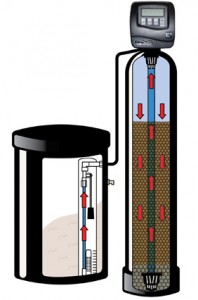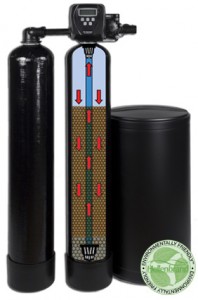Call or Text 303-736-9856

Single Tank Vs. Dual Tank Water Softeners
Dual Tank Water Softeners, also known as Twin Tank Water Softeners, have been used for decades in restaurants and commercial sites. In recent years they have become popular with homeowners too.
But do they have any “real world” benefits for the average family? Or is it just hype? We’ll review how both Water Softener designs work, and compare the advantages of each technology.
How Single Tank Water Softeners Work
A “Single Tank Water Softener”, is a system with 1 resin tank and 1 brine tank. The resin or mineral tank contains resin beads that remove the hard water minerals. The brine tank stores the salt.
“On-demand” single tank softeners count how many gallons you use. Once you reach capacity, they regenerate in the middle of the night. During regeneration, the system goes into bypass. No soft water is available during this time.
If you hit the limit in the middle of the day, you’d run out of soft water.
To avoid running out of soft water, most systems are sized with 30% additional capacity. You still run the risk of running out of soft water during very heavy water use, but your odds are improved.
Another negative with single tank systems is that they use hard water to clean themselves out during regeneration. High levels of hardness and iron can make this less effective. Imagine washing dishes in dirty water – you get the point.
Score: 8/10
How Dual Tank Water Softeners Work
“Twin Tank Water Softeners” have “2” resin tanks and 1 brine or salt tank.
Dual tank systems also regenerate on demand. But they have an immediate advantage.
When you hit capacity on 1 tank, the system immediately switches over to the 2nd tank.
No reserve capacity is required. No delayed regeneration in the middle of the night.
You maintain even, soft water under all circumstances.
Twin Tank Water Softeners also have the luxury of using soft water for all cycles during regeneration. Again, think of washing dishes in soft, clean water. Soft water regeneration is much more effective.
Score: 9/10
Which Softener is Right for You?
Single Tank Water Softeners have been the standard in homes for years. And in fairness, they do a pretty good job.
- Overall, you can expect:
- Lower cost from less equipment
- Smaller footprint takes up less space
- Good to better efficiency
- Relatively even water quality
Twin Tank Water Softeners are the rising star for residential homes. They have pros and cons too:
- Higher cost from the extra tank
- Require more space
- Highest efficiency for less water and salt waste
- More even water quality
So which system is right for you? Many of our customers are happy with single-tank systems. However, more and more are looking for something “better”, or more efficient. For those clients, a twin tank is the way to go.




Leave a comment